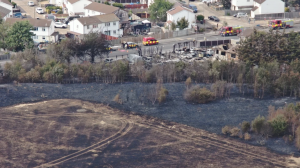Zoom boss apologises for security issues
Zoom is to pause the development of any new features to concentrate on safety and privacy issues, in the wake of criticism from users of the app.
In a blog, the chief executive of the video conferencing app apologised for “falling short” on security issues and promised to address concerns.
He said that the use of Zoom had soared in ways he could never have foreseen prior to the coronavirus pandemic.
One security expert said he hoped the company culture would change.
Zoom is now being used by millions of people for work and leisure, as lockdowns are imposed in many countries.
Eric Yuan spoke candidly about how “usage of Zoom ballooned overnight”.
“As of the end of December last year, the maximum number of daily meeting participants, both free and paid, was approximately 10 million. In March this year, we reached more than 200 million, he said.
He admitted that despite “working around the clock” to support the influx of new users, the service had “fallen short of the community’s – and our own – privacy and security expectations”.
“For that, I am deeply sorry,” he wrote.
“We did not design the product with the foresight that, in a matter of weeks, every person in the world would suddenly be working, studying, and socialising from home,” he wrote.
“We now have a much broader set of users who are utilising our product in a myriad of unexpected ways presenting us with challenges we did not anticipate when the platform was conceived.”
Zoom has been criticised for a range of privacy issues, including sending user data to Facebook, wrongly claiming the app had end-to-end encryption, and allowing meeting hosts to track attendees.
Ex-NSA (National Security Agency) hacker Patrick Wardle identified a series of issues, including a flaw which left Mac users vulnerable to having webcams and microphones hijacked.
Security consultant Graham Cluley said that Zoom faced “a crisis”.
“It risked losing a large amount of goodwill it had received because of revelations about its less-than-perfect attitude towards security and privacy.”
The fact that it was addressing some of the “alarming vulnerabilities” and had recognised the need to focus on security rather than “adding bells and whistles” was good news, he said.
“Let’s hope that the company’s culture will change from its previous ‘fast and loose’ attitude when it comes to such concerns,” he added.
There has been debate in the UK about whether the government should be using Zoom for cabinet meetings.
The government justified its use during “unprecedented times” when some members of government were self-isolating and did not have access to more secure technology at home.
But the debate intensified when prime minister Boris Johnson tweeted a picture which included the ID number of the latest meeting.









